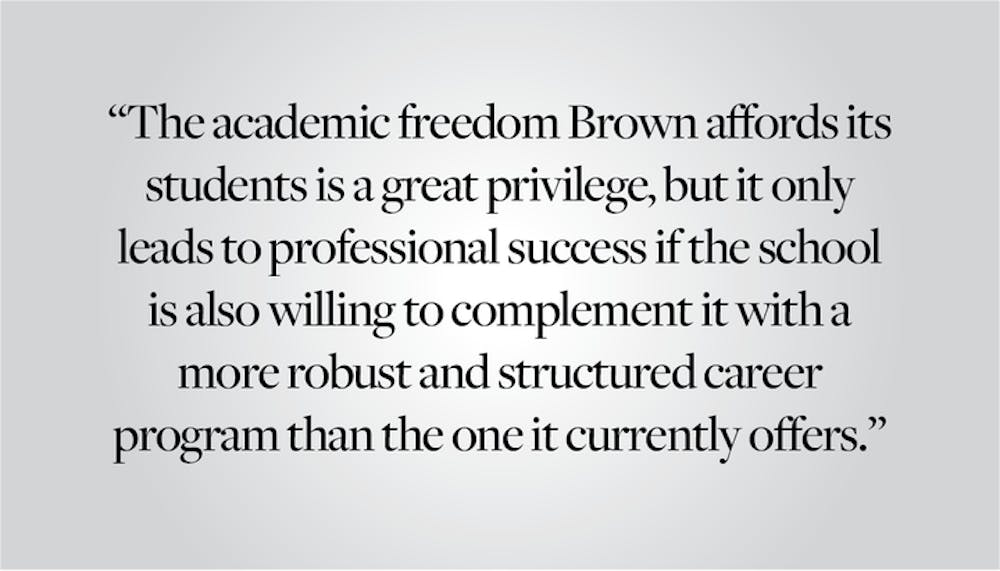From behavioral decision sciences to comparative literature to Modern Culture and Media, many Brown students proudly concentrate in unique disciplines without obvious corresponding career paths. The luxury of concentrating in niche academic areas is part of the beauty of Brown’s adventurous academic philosophy. But it also means that not all students have concentrations that are clearly transferable to the workforce — and due to a lack of core requirements, they won’t always get otherwise marketable skills outside of their concentration. Ultimately, because of its unstructured academic approach, Brown requires an exceptionally strong and proactive career services program. Students need such an office to provide practical support to complement their academic interests and ensure their sufficient preparation for the job market.
The Open Curriculum is a hallmark of Brown — perhaps its defining feature. For many of us, it drove our decision to come here in the first place. At Brown, unlike schools with clear pre-professional bents, many students graduate without a clear career path. Instead, the University honors and encourages indecision as undergraduates are given the space to explore interdisciplinary fields and creative interests without any core curriculum.
While Brown’s radical emphasis on exploration is invaluable, many students also ultimately attend college with the hope of finding a career and securing a job — a pressure that disproportionately weighs on low-income students. By letting students wander in their academic pursuits, Brown also takes on the responsibility to have a robust career services program that proactively helps students figure out how to leverage their liberal arts degrees in today’s workforce. If this were done correctly, Brown could both engage its students in the intellectual freedom of the liberal arts and prepare them to enter the job market — these are not mutually exclusive goals.
Brown’s CareerLAB does much of this already for students — and it does plenty to try and get students through the door — but students bear the responsibility of scheduling appointments with a career counselor or going to a variety of events and workshops. Brown’s career services may offer a lot, but to actually be effective, they have to do more than just exist passively in a Today@Brown announcement or as a handful of pages on the school’s website. Brown’s empowering and uniquely hands-off academic design demands a more proactive role from CareerLAB.
While CareerLAB reaches out broadly to first-years, imagine a career advising system that has a real person directly contact students as early as freshman year. Students could get paired with a career advisor right as they enter the University, just as they are with an academic advisor. In a similar structure to Brown’s current system of advising groups, students could participate in monthly workshops and receive targeted guidance with a built-in cohort of students who share similar pre-professional goals. This would also mean that they could go through the job application process with their peers. Having a community during the conventionally isolated career search experience could make it less cutthroat and more collaborative.
Ultimately, rather than relying on students to seek out career programming for themselves, this support should be integrated into the Brown student identity and experience. This preparation is nothing short of a necessity, especially in the context of our generation.
Generation Z is leading a new wave of job-hopping: According to a LinkedIn survey on U.S. workers, 72% of Gen Z workers expressed plans to change their careers within the next 12 months. Young professionals are eager to establish careers that align with their values and are not afraid to switch jobs to achieve this. Our values are often what guide us to our concentrations in the first place, so making sure that Brown graduates are confident in networking, interviewing, developing a LinkedIn presence, building a resume, and writing cover letters — among other skills — is essential for a generation that is so likely to move between jobs. Beyond helping students secure employment immediately after graduation, a more integrated career services presence could also give Brown students the skills to depart unsatisfactory jobs later in their careers.
The academic freedom Brown affords its students is a great privilege, but it only leads to professional success if the school is also willing to complement it with a more robust and structured career program than the one it currently offers. It behooves Brown to make these changes as they will lead to more successful alumni and reassure prospective students of their return on investment. In the face of an uncertain economic outlook and three years that have upended conventional wisdom about corporate America — from the tech industry to in-person work — now is the time for Brown to strengthen its career infrastructure and build a more professionally savvy student body.
Yael Wellisch ’26 can be reached at yael_wellisch@brown.edu. Please send responses to this opinion to letters@browndailyherald.com and other op-eds to opinions@browndailyherald.com.
Yael is the senior editor of opinions of The Herald's 135th editorial board. She previously served as an opinions editor and a member of the Editorial Page Board. She is from Washington, D.C. and studies history and international and public affairs.





